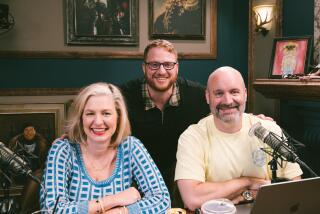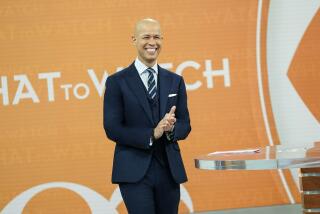Public radio, private lives
THERE’S TROUBLE ON the left side of the dial. As was reported Jan. 14 on page B3 of this newspaper (What? You didn’t see it?), KCRW-FM announcer Chris Douridas, host of “New Ground,” the exceedingly mellow alternative music show that airs on Saturdays, was arrested Jan. 6 outside the Circle Bar in Santa Monica for allegedly drugging and attempting to kidnap a 14-year-old girl.
Not many details are yet known, but the allegation is that Douridas, 43, was seen slipping a substance into the girl’s drink and, along with a friend, carrying her out of the bar around midnight, at which point she became ill. Toxicology results aren’t yet in, and so far no charges have been filed. KCRW, for its part, is standing behind Douridas, who reportedly posted a $1-million bond and remains on the air, steady and smooth-voiced as ever.
For devotees of Southern California public radio, a group for whom KCRW is nothing less than the sacred bovine of bourgeois identification, this news was downright world-rocking, as unthinkable as the notion of an insider-trading scandal in the Unitarian church.
I’m a fan of Douridas myself -- personally, I think he has the best music show on the station -- and at this stage, I still find it difficult to believe that the man who has championed legions of musicians (many of them the kind of female singer/guitar strummers who sing earnestly about things like date rape) would drug a 14-year-old girl in a bar.
But there’s something about public radio in general, and KCRW in particular, that elicits strong emotions from both sides of the cultural divide.
If there’s a single soundtrack that accompanies the lives of the liberal cognoscenti, it’s the ambient noise of public radio, which wafts through the atmosphere of middle- and upper-middleclass educated homes like some kind of sonic air freshener.
Whether it’s music, news programming or even the quarterly pledge drives (the Southern Californian’s notice that the season has changed), public radio is the comfort food of the self-congratulatory not-masses, as soothing to our rarified ears as the sound of a Volvo engine turning over.
For us (or do I mean “them”? ... OK, “us”), the idea that a beloved local host could be charged with a sex crime is simply unthinkable.
Others, though, are nearly choking on the drool of their schadenfreude. When the news of Douridas’ arrest broke, even the fact that it was buried on page B3 didn’t keep people from circulating e-mails filled with catty conjectures about who might be next. What if Daniel Schorr was caught shoplifting at Wal-Mart? Imagine if Terry Gross was nabbed on Sunset Boulevard in a compromising position with Divine Brown. Imagine!
Though it may come as a surprise to those for whom “I heard it on NPR” is as constant an utterance as “uh, you know,” there are plenty of people who hate public radio. The preciousness, the smugness, the endless arrangements of the “All Things Considered” theme music -- these are as vulnerable to attack as the U.S. ports.
And there’s also a growing smolder of outrage in both camps about KCRW’s decision to keep Douridas on the air while prosecutors investigate his case. Some think an institution that famously touts its commitment to feminism and sensitivity ought to strongly encourage someone in Douridas’ predicament to take a little time off to sort out his business. Others think that even being a suspect should be enough to have a person booted from his job. (This is, after all, the station that gave commentator Sandra Tsing Loh a permanent vacation after she accidentally said the “f” word on the air.) The whole situation is more than a little ironic, but hey, public radio loves irony as much as local TV news loves car chases.
In fairness to KCRW and to Douridas, who has still not been charged with any crime, much less convicted of one, the main player in this melee, at least at this juncture, is not Douridas but the internal conflict of his station’s listeners.
If the war between public radio lovers and public radio haters has a neurotic charge to it, it’s because often these people are one and the same. Sure, we can’t stand much of public radio’s folksy yammerings, but if it went away, we’d feel like burglars had broken in and stolen all our furniture.
We either love the fact that we hate it, or hate the fact that we love it. In any case, we’re committed for life.
Unlike commercial radio personalities, many of whom occupy a cultural space somewhere between sound-effects-obsessed cheeseball and dissolute burnout (and who seem disproportionately to preface their names with “Uncle”), NPR announcers, particularly the local ones, are the grown-up world’s version of popular college professors. We put our faith in their knowledge, their tastes and their sense of decorum.
But even college professors, like Swedish cars, can fail us on occasion. And just as students eventually learn that their teachers are fallible, adults must reckon with their heroes’ darker sides. Public radio fans don’t run across this problem very often, but when it happens, it’s a bit like losing control of your Volvo. Talk about the impotence of being earnest.
More to Read
The biggest entertainment stories
Get our big stories about Hollywood, film, television, music, arts, culture and more right in your inbox as soon as they publish.
You may occasionally receive promotional content from the Los Angeles Times.











